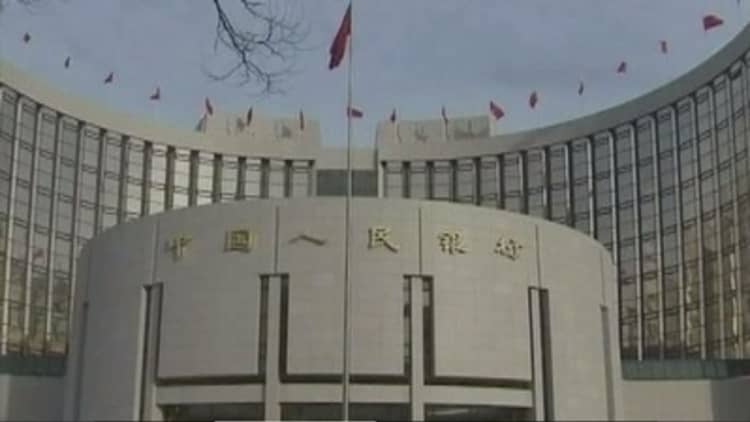
China's central bank guided the yuan a shade higher Friday, a day after a hefty decline in the currency rocked financial markets and fanned renewed worries over the health of the world's second-largest economy.
The People's Bank of China (PBOC) set the yuan reference rate at 6.5636 against the dollar, up 0.02 percent from Thursday's fix and higher than the yuan's closing rate of 6.5929 in onshore trading on Thursday. Friday's fix was the first time in nine days that the PBOC set the the yuan reference rate higher.
The PBOC on Thursday had guided the yuan lower at the fastest pace since its shock devaluation in August, prompting a shuttering of mainland stocks and roiling markets elsewhere.
China's central bank lets the yuan spot rate rise or fall a maximum of 2 percent against the dollar, relative to the official fixing rate.
The yuan gained following the fix, rising to 6.5885 in onshore trading Friday. Yuan traded offshore also climbed to 6.6799 against the dollar, having plunged to as much as 6.7511 on Thursday.
Friday's fix helped mainland stock markets recover, with Chinese equities climbing more than 2 percent. China's stock market regulator also scrapped a circuit breaker overnight that had halted trading twice since it came to force on Monday.
"We're seeing a little bit of a relief rally but I think the impact should be short-lived, a couple of days maybe. The mid-term outlook for the yuan is still weak given the capital outflows and the slowdown in the economy," said Claudio Piron, emerging Asia fixed income and currency strategist at Bank of America Merrill Lynch.
"The PBOC's dilemma is how to steady the market while adjusting the currency to a more market-based regime," he said.
Convulsions in the currency market have been at the heart of investors' concerns in recent sessions and have tested the resolve of Chinese policymakers, just months after the International Monetary Fund (IMF) announced plans to include the currency in its Special Drawing Rights (SDR) basket..
For one, the weakness in the yuan has fanned speculation that China is trying to use the currency to goose its economy, which is currently growing at its slowest pace since the global financial crisis.
The drops in yuan have also sent other emerging market currencies down, sparking concerns that economies across the world may let their currencies weaken to maintain competitiveness.
A slump in the yuan also risks exacerbating capital outflows, that have accelerated in recent months. The more stocks fall on cues from a lower yuan, the more investors may be encouraged to yank funds out of China and park them overseas, in turn exerting further pressure on the yuan.
And falls in the yuan, coupled with the strength in the dollar, could increase political friction ahead of U.S. presidential elections.
A resolute defense of the yuan also comes at a cost.
Continuing to prop up the currency would take a toll on China's foreign exchange reserves, while straining the amount of spare cash in the banking system. China's foreign exchange reserves declined by $512.66 billion in 2015, the steepest fall on record.
For now, analysts expect the PBOC to try and manage a more steady depreciation and step in if moves become more pronounced.
"The PBOC is trying to instill two-way risks in the yuan as it doesn't want investors to get carried away on speculation that the currency will continue to slide," said Mitul Kotecha, head of Asian interest rate and foreign exchange strategy at Barclays.
The central bank was suspected on Thursday to have intervened in the offshore yuan market, which typically is more free than its onshore counterpart and has seen more pronounced declines.
And on Friday, Reuters reported that the PBOC was buying yuan in the onshore market. China's foreign exchange regulator has ordered banks in some trading hubs to limit dollar purchases this month in the latest attempt to stem capital outflows, Reuters added.
BoAML's Piron said the policymakers could also provide more stimulus or reverse capital liberalizations to restore confidence.



